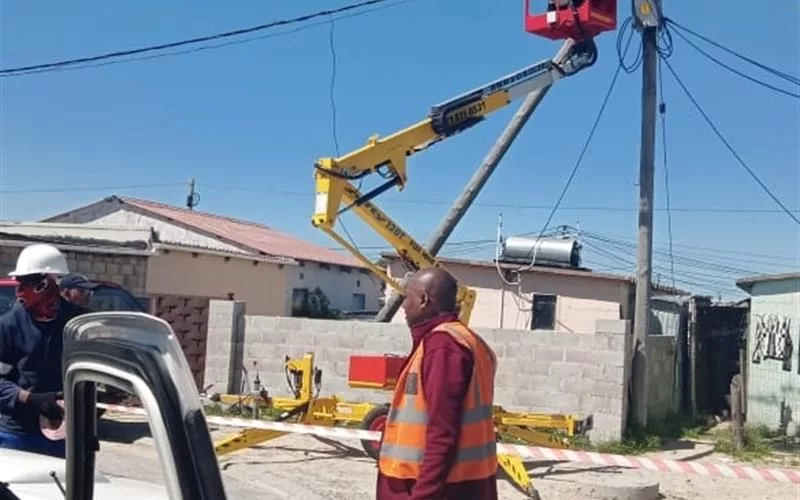Cape Town is fighting against illegal electricity connections with the creation of the Energy Law Enforcement and Technical Unit (ELETU) and offering rewards to residents for reporting damage to municipal electrical infrastructure. The success of the city’s initiative is evident in Mfuleni, a suburb that has undergone an impressive transformation from a hotspot for illegal connections to enjoying legal electricity connections. The city also encourages anonymous tip-offs via a hotline number to curb infrastructural vandalism.
How is Cape Town fighting against unlawful electricity supply?
Cape Town’s metropolitan government has created the Energy Law Enforcement and Technical Unit (ELETU) to protect electrical structures from manipulation, vandalism, theft, and unlawful links. The city is also rewarding residents for reporting damage to municipal electrical infrastructure and offering efficient channels to do so. The initiative has yielded favorable outcomes, with almost all mature informal settlements in the metro now enjoying legal electricity connections. The Mfuleni suburb is a shining example of the success of the city’s unwavering crusade against illegal power hook-ups.
Creating a New Paradigm: Cape Town’s Fight against Unlawful Electricity Supply
As daylight crests over Mfuleni, an expansive suburb nestled in the core of Cape Town, South Africa, a remarkable revolution is underway. The city’s unwavering crusade against unlawful power hook-ups is bearing considerable returns, reconfiguring the urban vistas and revamping the essence of communal living.
Cape Town’s metropolitan government, colloquially known as ‘The City’, has surfaced as a symbol of tenacity and effectiveness in this constant battle against illegal electrical activities. The mission of this initiative is dual-fold: to safeguard the city’s vital infrastructure and confirm legal electricity distribution to all inhabitants. Pioneered by the recently instituted Energy Law Enforcement and Technical Unit (ELETU), a dedicated task force aimed at protecting electrical structures from manipulation, vandalism, theft, and unlawful links, the City is advancing in this struggle.
This endeavor does not come without its hurdles. The illicit connections often invite vandalism, rendering repairs and disconnections hazardous and sometimes unattainable. This situation strains the city’s resources and plunges entire communities into darkness. Despite these challenges, the team’s determination remains unbroken, yielding favorable outcomes.
Triumph over Illegal Connections: The Transformation of Mfuleni
Once a hotspot for illegal connections, Mfuleni has undergone an awe-inspiring turnaround. The destructive loop of unlawful connections causing overload and subsequent power blackouts has been disrupted. The City’s focus on protecting its infrastructure and guaranteeing legal supply to its residents has played a crucial role in this metamorphosis. This law enforcement has not been a solitary fight; the South African Police Service (SAPS) has been an unwavering ally in regular operations, their combined efforts having a profound impact.
The Mfuleni residents have transitioned from passive observers to active contributors in this shift. They are urged to report any illicit connections and vandalism. Councillor Van Reenen’s call to ‘ACT together. Protect your power’ has echoed throughout the community, fortifying a sense of collective accountability.
The City’s victories extend beyond Mfuleni. Almost all of the mature informal settlements in the metro, within the City supplied territories and on City-owned land, now enjoy legal electricity connections. The power, which once lit only a handful of homes, now reaches every corner of each settlement, a tribute to the City’s unwavering dedication and effective strategies.
Reward and Report: Measures to Curb Infrastructural Vandalism
The City’s endeavor to check infrastructural vandalism and illegal links spans beyond its operations. A bounty of R5,000 awaits anyone offering information that results in an arrest and conviction, seizure of stolen or illegal items, or those instrumental in reporting vandalism, damage, or theft of electricity infrastructure or illegal connections. SAPS continues to play its crucial role as the foremost authority in crime prevention, further fortifying the City’s initiatives.
The City has also introduced efficient channels for residents to report damage to the municipal electrical infrastructure. Text messages to 31220 and emails to power@capetown.gov.za are accepted, and anonymous tip-offs are encouraged via the round-the-clock hotline number 0800 1100 77.
A Shining Beacon: Hope and Success in Mfuleni
As the City forges ahead in its mission to obliterate illegal connections and safeguard its infrastructure, Mfuleni’s story serves as a radiant symbol of hope and accomplishment. Its streets, which were once dimmed by the specter of illegal connections, now rejoice in the radiance of legal, uninterrupted power supply — a testament to a community’s resilience and a city’s tenacity.
1. How is Cape Town fighting against unlawful electricity supply?
Cape Town’s metropolitan government has created the Energy Law Enforcement and Technical Unit (ELETU) to protect electrical structures from manipulation, vandalism, theft, and unlawful links. The city is also rewarding residents for reporting damage to municipal electrical infrastructure and offering efficient channels to do so.
2. What is the Energy Law Enforcement and Technical Unit (ELETU)?
ELETU is a dedicated task force aimed at protecting electrical structures from manipulation, vandalism, theft, and unlawful links, pioneered by Cape Town’s metropolitan government.
3. What is the City’s mission in fighting against illegal electrical activities?
The City’s mission is dual-fold: to safeguard the city’s vital infrastructure and confirm legal electricity distribution to all inhabitants.
4. What is the reward for reporting damage to municipal electrical infrastructure?
A bounty of R5,000 awaits anyone offering information that results in an arrest and conviction, seizure of stolen or illegal items, or those instrumental in reporting vandalism, damage, or theft of electricity infrastructure or illegal connections.
5. How can residents report damage to municipal electrical infrastructure?
Residents can report damage to municipal electrical infrastructure through text messages to 31220 and emails to power@capetown.gov.za. Anonymous tip-offs are encouraged via the round-the-clock hotline number 0800 1100 77.
6. What is the success story of Mfuleni?
Mfuleni, a suburb in Cape Town, has undergone an awe-inspiring turnaround from a hotspot for illegal connections to enjoying legal electricity connections. The Mfuleni residents have transitioned from passive observers to active contributors in this shift. They are urged to report any illicit connections and vandalism.








